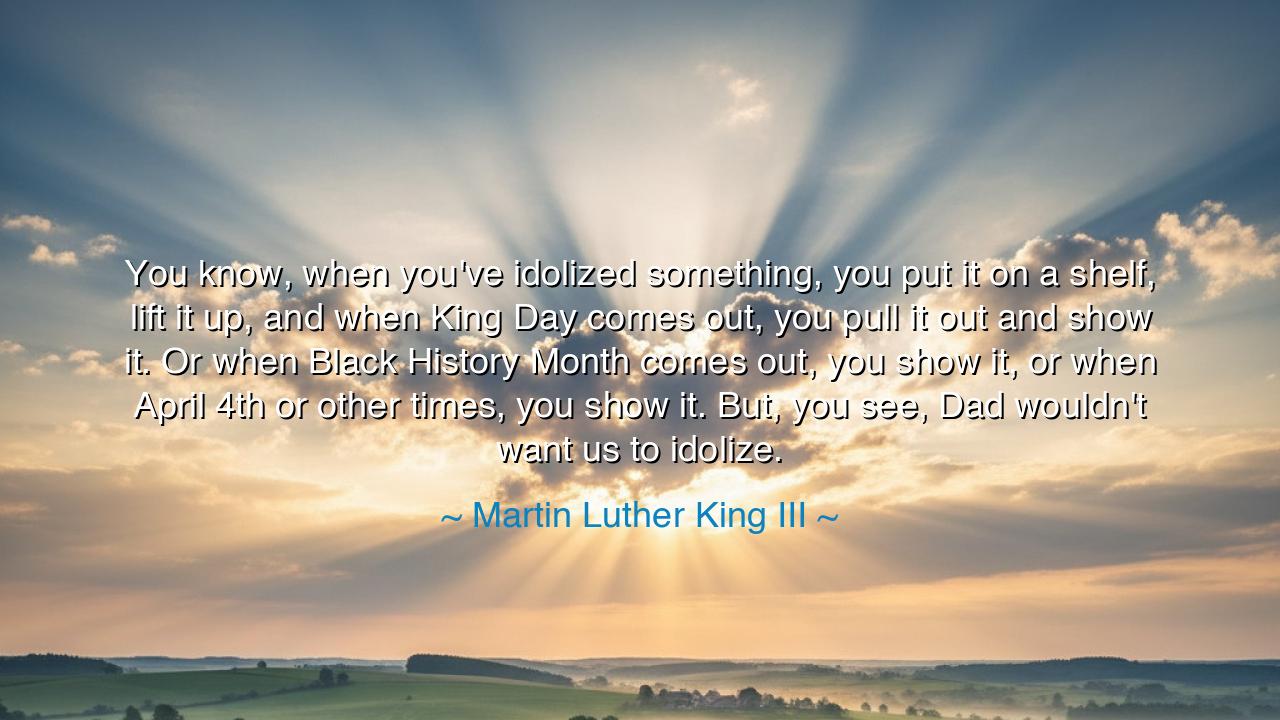
You know, when you've idolized something, you put it on a shelf
You know, when you've idolized something, you put it on a shelf, lift it up, and when King Day comes out, you pull it out and show it. Or when Black History Month comes out, you show it, or when April 4th or other times, you show it. But, you see, Dad wouldn't want us to idolize.






“You know, when you've idolized something, you put it on a shelf, lift it up, and when King Day comes out, you pull it out and show it. Or when Black History Month comes out, you show it, or when April 4th or other times, you show it. But, you see, Dad wouldn't want us to idolize.” Thus spoke Martin Luther King III, the son of a prophet and dreamer, reflecting on the legacy of his father, Dr. Martin Luther King Jr. In his words lies a truth both profound and urgent: that the greatness of a man, especially one who lived for justice, should not be worshiped as something distant and untouchable, but lived as something near, practical, and alive. For to idolize is to freeze the flame of meaning into a monument of memory, while to live the message is to keep that flame burning in the hearts of the living.
King III warns us against the subtle danger of idolization, for it disguises forgetfulness as honor. When we lift heroes onto pedestals, we often lift them out of relevance. We admire their courage, but excuse ourselves from embodying it. We celebrate their birthdays, but forget their burdens. The world loves to remember its saints when it no longer feels their challenge. To turn Dr. King into a symbol for one day, a name for a street, or a picture in a classroom—while ignoring the injustices that still plague the world—is to praise the dream while neglecting the duty. His son reminds us that his father would not have wanted reverence; he would have wanted responsibility.
The origin of this wisdom lies not in cynicism, but in the same spirit of truth that guided Dr. King himself. Throughout his life, the elder King sought not to be worshiped, but to awaken others—to stir conscience, to inspire action. He walked among the poor, the weary, and the forgotten, never claiming divinity, but demanding that every soul recognize its own power to act in love and justice. When he preached of nonviolence, it was not as a saint above the people, but as a man among them. To idolize such a man is to undo his purpose, for it turns his example into decoration rather than transformation.
Consider the story of Mahatma Gandhi, whose philosophy so deeply influenced Dr. King. After Gandhi’s death, statues of his likeness were raised across India, yet many who bowed before them ignored the suffering and division that still festered among their neighbors. His teachings became relics, recited but rarely practiced. This is the fate of all prophets when their followers mistake veneration for imitation. The world praises their memory, but forgets their mission. So too, Martin Luther King III reminds us, we must not let his father’s name become a symbol polished for parades and speeches, but a call to conscience that still demands an answer.
“Dad wouldn’t want us to idolize,” he says. These words pierce through comfort and ceremony. For what his father dreamed of was not a shrine, but a society; not applause, but awakening. He wanted his message to live in the streets, in the schools, in the hearts of ordinary people. Every act of kindness, every word of truth, every step toward justice is the true commemoration of his life. To honor him is not to light candles once a year, but to carry his torch every day, through the dark corridors of inequality and hate.
The lesson here is one of living remembrance. When you admire a hero, do not build them a shrine—build yourself into their vision. Do not wait for holidays to speak their name; let their principles shape your daily choices. Ask not, “What would Dr. King do?” but rather, “What can I do now?” For justice is not an event, but a habit; peace is not a ceremony, but a practice. The truest respect we can offer to those who changed the world is to continue their work in our own generation.
So, my child, when you see the image of Dr. King, do not stop at admiration. Let his voice remind you that love without action is only sentiment, and memory without movement is only shadow. Let every day become a King Day, every month a Black History Month, every action a sermon of equality and compassion. Do not lift his dream onto a shelf—live it. For the son of the dreamer has told us plainly: his father was not meant to be idolized, but imitated. And when we do so, the spirit of Martin Luther King Jr. will not rest in marble or memory—it will march again, alive in us all.






AAdministratorAdministrator
Welcome, honored guests. Please leave a comment, we will respond soon